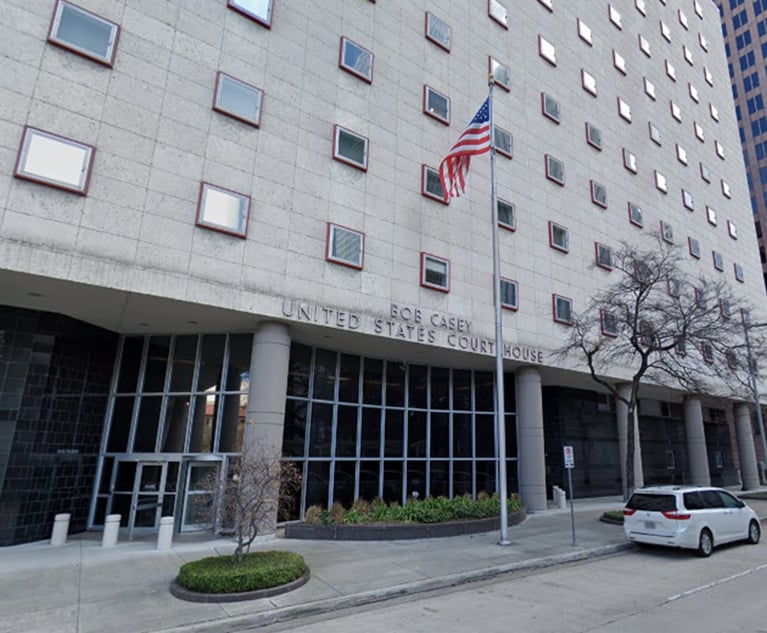Merged Firm Faces $214M Malpractice Suit Over Kaye Scholer Work
Billionaire Ira Rennert is looking to hold Arnold & Porter Kaye Scholer accountable for the alleged shortcomings of one of its predecessors.
January 10, 2018 at 03:23 PM
4 minute read
 Ira Rennert's Fair Field estate in the Hamptons.
Ira Rennert's Fair Field estate in the Hamptons.
A $214 million malpractice lawsuit lodged this week by billionaire Ira Rennert served up a reminder that a merged law firm—in this case, Arnold & Porter Kaye Scholer—can't always avoid fallout from events that trace back to one of the firm's predecessors.
Rennert's investment company, The Renco Group Inc., filed suit on Tuesday in New York state court, alleging malpractice against his former lawyers from Kaye Scholer, now part of Arnold & Porter Kaye Scholer after a 2016 merger. The malpractice claim arises out of Kaye Scholer's defense work for Renco in a case brought by the bankruptcy trustee for Magnesium Corp. of America, a company that Rennert controlled for several years before it went bankrupt in 2001.
In that underlying case, MagCorp's bankruptcy trustee accused Rennert of siphoning more than $118 million from the magnesium company's coffers and alleged that the billionaire put at least some of that amount toward building a palatial, beachfront estate in the Hamptons on New York's Long Island. Ultimately, a federal jury sided with MagCorp's trustee and put Renco on the hook for damages of more than $117 million, an amount that, thanks to interest, later increased in a final judgment to about $214 million.
Although most of Renco's allegations in the malpractice suit filed Tuesday relate specifically to work that happened when Kaye Scholer was still an independent firm, the complaint does name Arnold & Porter Kaye Scholer as a defendant. In that respect, Arnold & Porter Kaye Scholer is hardly alone among large law firms that have merged, only to later see the combined firm face claims that related specifically back to one of the predecessor firms.
As another recent example, Norton Rose Fulbright has found itself in a similar situation after combining with Chadbourne & Parke at a time when that firm faced gender bias allegations from former female partners. Not long after the Norton Rose Fulbright deal took effect in June, the female former Chadbourne partners leading the gender bias suit added the combined law firm as a defendant.
Rennert has denied that he looted MagCorp and has maintained that, at the time he transferred money out of the company, it was financially sound. The malpractice suit accuses Kaye Scholer of missteps that led to what Renco considers an “inexplicably inconsistent” verdict in the looting case, that resulted because the jury effectively conflated federal and state law.
Renco alleges that Kaye Scholer—led by former partner Peter Haveles, who has since moved to Pepper Hamilton—could have done more to avoid such an inconsistent verdict. Specifically, Renco said that the Kaye Scholer team could have objected to jury instructions before the trial, or it could have sought a mistrial immediately after the verdict came down. Instead, the defense team asked for a mistrial later, prompting a judicial ruling that found Renco's lawyers should have raised their objection earlier.
“After the verdict was read, the judge repeatedly asked counsel whether they had any objections or issues to raise before the jury was dismissed,” wrote Rennert's lawyers in the malpractice suit, led by Steven Kaufman of Kaufman & Company. “Rather than raising an appropriate objection at that time, defendants … responded that counsel saw no reason why the jury should not be dismissed, which resulted in a waiver of the … objection.”
A spokeswoman for Arnold & Porter Kaye Scholer said in an email on Wednesday that the firm doesn't comment on pending litigation, but added, “We will vigorously defend these allegations and we are confident that we have fulfilled our professional obligations.”
This content has been archived. It is available through our partners, LexisNexis® and Bloomberg Law.
To view this content, please continue to their sites.
Not a Lexis Subscriber?
Subscribe Now
Not a Bloomberg Law Subscriber?
Subscribe Now
NOT FOR REPRINT
© 2024 ALM Global, LLC, All Rights Reserved. Request academic re-use from www.copyright.com. All other uses, submit a request to [email protected]. For more information visit Asset & Logo Licensing.
You Might Like
View All
Cleary vs. White & Case: New York City Showdown Over $5 Billion Brazilian Bankruptcy

Davis Polk Lands Spirit Chapter 11 Amid Bankruptcy Resurgence
Trending Stories
- 1‘Not a Kindergarten Teacher’: Judge Blasts Keller Postman, Jenner & Block in Mass Arb Dispute
- 2A&O Shearman, Hogan Lovells and the Stories That Shaped Africa This Year
- 3Borden Ladner Gervais Cyber Expert Warns of AI-Boosted Ransomware Attacks
- 4Phila. Judge Upholds $68.5M Verdict Over Construction Worker's Death
- 5Biden Vetoes Bill to Create More Federal Judgeships
Who Got The Work
Michael G. Bongiorno, Andrew Scott Dulberg and Elizabeth E. Driscoll from Wilmer Cutler Pickering Hale and Dorr have stepped in to represent Symbotic Inc., an A.I.-enabled technology platform that focuses on increasing supply chain efficiency, and other defendants in a pending shareholder derivative lawsuit. The case, filed Oct. 2 in Massachusetts District Court by the Brown Law Firm on behalf of Stephen Austen, accuses certain officers and directors of misleading investors in regard to Symbotic's potential for margin growth by failing to disclose that the company was not equipped to timely deploy its systems or manage expenses through project delays. The case, assigned to U.S. District Judge Nathaniel M. Gorton, is 1:24-cv-12522, Austen v. Cohen et al.
Who Got The Work
Edmund Polubinski and Marie Killmond of Davis Polk & Wardwell have entered appearances for data platform software development company MongoDB and other defendants in a pending shareholder derivative lawsuit. The action, filed Oct. 7 in New York Southern District Court by the Brown Law Firm, accuses the company's directors and/or officers of falsely expressing confidence in the company’s restructuring of its sales incentive plan and downplaying the severity of decreases in its upfront commitments. The case is 1:24-cv-07594, Roy v. Ittycheria et al.
Who Got The Work
Amy O. Bruchs and Kurt F. Ellison of Michael Best & Friedrich have entered appearances for Epic Systems Corp. in a pending employment discrimination lawsuit. The suit was filed Sept. 7 in Wisconsin Western District Court by Levine Eisberner LLC and Siri & Glimstad on behalf of a project manager who claims that he was wrongfully terminated after applying for a religious exemption to the defendant's COVID-19 vaccine mandate. The case, assigned to U.S. Magistrate Judge Anita Marie Boor, is 3:24-cv-00630, Secker, Nathan v. Epic Systems Corporation.
Who Got The Work
David X. Sullivan, Thomas J. Finn and Gregory A. Hall from McCarter & English have entered appearances for Sunrun Installation Services in a pending civil rights lawsuit. The complaint was filed Sept. 4 in Connecticut District Court by attorney Robert M. Berke on behalf of former employee George Edward Steins, who was arrested and charged with employing an unregistered home improvement salesperson. The complaint alleges that had Sunrun informed the Connecticut Department of Consumer Protection that the plaintiff's employment had ended in 2017 and that he no longer held Sunrun's home improvement contractor license, he would not have been hit with charges, which were dismissed in May 2024. The case, assigned to U.S. District Judge Jeffrey A. Meyer, is 3:24-cv-01423, Steins v. Sunrun, Inc. et al.
Who Got The Work
Greenberg Traurig shareholder Joshua L. Raskin has entered an appearance for boohoo.com UK Ltd. in a pending patent infringement lawsuit. The suit, filed Sept. 3 in Texas Eastern District Court by Rozier Hardt McDonough on behalf of Alto Dynamics, asserts five patents related to an online shopping platform. The case, assigned to U.S. District Judge Rodney Gilstrap, is 2:24-cv-00719, Alto Dynamics, LLC v. boohoo.com UK Limited.
Featured Firms
Law Offices of Gary Martin Hays & Associates, P.C.
(470) 294-1674
Law Offices of Mark E. Salomone
(857) 444-6468
Smith & Hassler
(713) 739-1250












